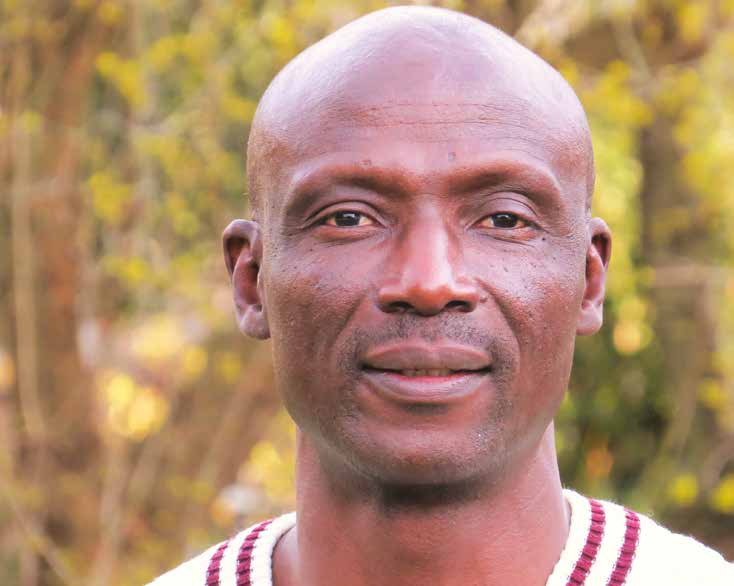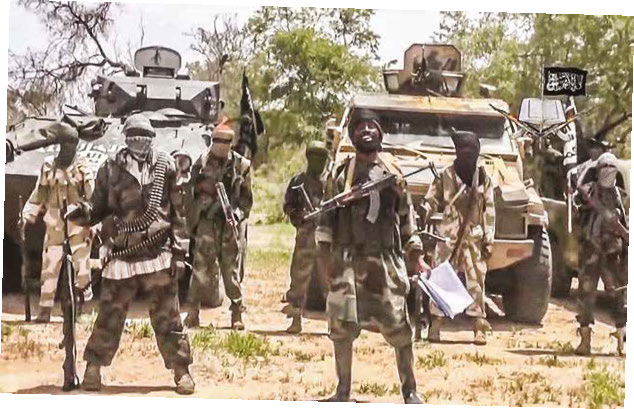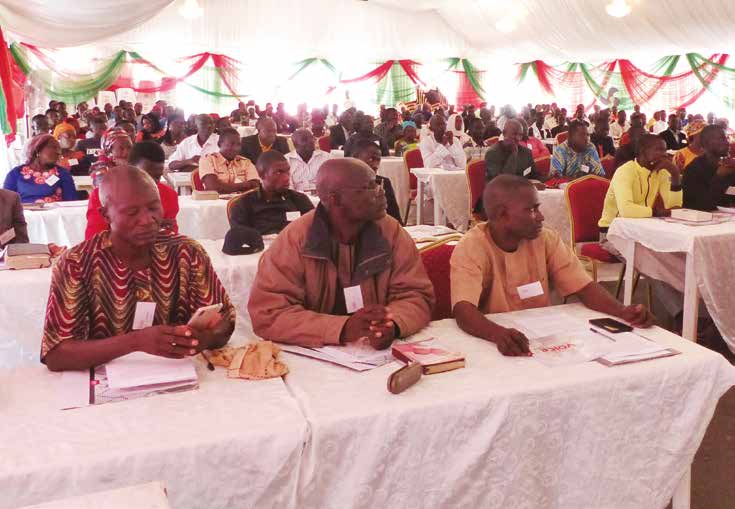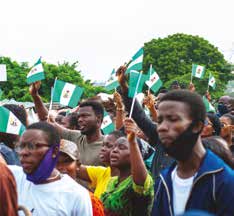
In a special interview, our partner Hassan John explains what the future holds for Christians in areas where killing has reached genocidal levels; how God has protected and strengthened him personally and how the prayers and gifts from Release International supporters are helping to revitalise hope and win many to Christ.
Q: From the UK it seems the situation in Nigeria is getting worse. How would you sum up life there at present for Christians? And how do you see Nigeria – and, more broadly, West Africa – developing in the next few years? What are the biggest concerns, in terms of persecution?
Christians in Nigeria have long faced some level of persecution by the northern Islamic Caliphate, from the time the Christian Missionary Society (CMS) began transforming societies in West Africa. Those familiar with Nigeria’s history know that the experimental political arrangement for the country at independence in 1960 collapsed three years later; an intrinsic fear of domination by the Christian south grew and some sought solutions in military coups. But this simply deepened the religious divide and in 1967 a three-year war broke out that killed about a million southern Igbo Christians. You will know it as the Biafra war. In many ways, the country never healed from that war.
Years of military dictatorship suppressed religious outbursts – although not without incidents like the Maitatsine religious riots in the 1980s and the killings and beheadings of Christians in Kano, Kaduna and Zaria, on accusations of blasphemies or insulting the Koran or the Prophet Mohammed.
As you say, things have got far worse with the violence perpetrated by radical Islamist groups in northern Nigeria. The terrorist Islamist sect, Jamā’at Ahl as-Sunnah lid-Da’wah wa’l-Jihād (People of Islamic preaching and Jihad), popularly called Boko Haram, are not the only radical Islamist sect in the country. There are at least six different sects currently, according to Nigeria’s security agencies. These include Islamic State in West Africa Province (ISWAP) al- Qaeda, Fulani Islamist militia groups and Sara Suka among others. Boko Haram copied the Islamist terrorist group ISIL, using social media for its propaganda and its attack on the United Nations building in Abuja, Nigeria, as well as its abduction of the Chibok schoolgirls, which raised its profile on the international stage. The Global Terrorism Index named Boko Haram the deadliest terrorist organisation in the world in 2018.

Boko Haram’s declared mission statement, in its very first propaganda video in 2010, was to attack and
kill Christians and destroy anything that it deems as ‘western’, that is, democracy and ‘western education’ introduced by Christian missionaries in Nigeria.
The radical Fulani Islamist militia are affiliated to Boko Haram and its ideology and have targeted Christian villages in central Nigeria. The group, said to be the fourth deadliest group, according to the Global Terrorism Index, has killed over 3,000 people between January and June this year. It has destroyed over 300 villages in Southern Kaduna, Plateau, Benue and Taraba states and displaced more than 1.3 million people.
More recently, the Ansaru Islamic terrorist group has been active in the Sahel region together with al-Qaeda in the Maghreb. This group has been operating in communities and villages in southern Kaduna state, killing, raping and kidnapping for ransom.
It is now clear that the Nigerian Government lacks the political will and the security forces have been weakened by both political compromises and corruption among senior ranking officers, who, as Christian Association of Nigeria (CAN) has pointed out, were mostly promoted and positioned based on religious affiliation. The Army has proven its lack of capacity to effectively and professionally execute its duty to defend Nigeria’s citizens.
Analysts have repeatedly said that Nigeria is fast drifting into a failed state. The growing anarchy, the high level of insecurity and the inability of the Government to provide social and economic security to its citizens have generated speculation that Nigeria, in its current state, will not survive for long as a united entity. Another civil war could destabilise the whole West Africa region but impact the wider world, particularly Europe, with an influx of refugees.
In terms of persecution, the biggest concern is whether the churches in northern Nigeria can survive another decade of this intense violence. Currently over 3,000 churches have been destroyed in northern Nigeria, according to CAN.
Pastors have been targeted and killed and worship services have been attacked by gunmen. Christian schools have been attacked and many forced to close. Analysts estimate that over three million children have been forced out of school by these attacks. The persecution has risen to a genocidal level which, unfortunately, the international community has chosen to ignore.

Q: February sees another presidential election in Nigeria. How is that likely to impact Christians?
The elections will be decided, not on issues of national development nor on the capability and integrity of the candidates, but on religious divides. Currently social media and local news reports are agog with the rejection of two Muslims as presidential and vice-presidential candidates. Many popular Islamic clerics see the protest by Christians against ‘an Islamic agenda’ as an attack on Islam and are calling on Muslims to do everything necessary to ensure the dominance of Muslims in the forthcoming elections. This tension is likely to lead to political violence and the loss of lives. With well-armed and well-funded radical Islamic militia groups in control of large regions of the country, it is certain that the violence against Christians will escalate.
Q: You are personally involved in Christian ministry and also in encouraging and equipping other ministers. So how are you personally coping with the on-going violence perpetrated against Christians and Christian communities?
I always have every reason to thank God for His mercies and protection. I can recount a number of times the Lord has saved me from being kidnapped or killed by Fulani Islamist militia groups or Boko Haram as I go from one community to the other to meet with church ministers and community leaders. For example, on one occasion we were on our way to Chibok (where the schoolgirls were abducted by Boko Haram in April 2014). Due to persistent attacks by Boko Haram in the area, we were advised to take a particular road later in the evening. But because of a ‘feeling’ I can’t really explain – and against advice – we went by a different route (deemed more dangerous). The next day, after our meeting with pastors, we were stopped by people blocking the road. We could see smoke rising from a burning village. We were relieved to discover that the men were a combined force of soldiers and civilian task force, returning from engaging Boko Haram the previous evening. It turned out that had we taken the recommended route we would have met Boko Haram! Our testimonies of what the Lord has done are many.
It is a traumatic experience constantly meeting people whose family members have been killed, praying at countless mass graves almost every week, and meeting and praying with victims who have lost limbs or have life-changing wounds from a senseless attack. It is difficult all the time. I always pray for strength; for the Lord to give me words of comfort and the wisdom to say what will bring healing and to be able to plead for love for those who hate us rather than carrying hatred and seeking vengeance. It is tough.
Q: In recent times you have been involved in training church leaders and evangelists to strategically take the gospel into some of the most dangerous areas in Nigeria. What can you tell us about that, and about how the work is progressing?
This is an exciting aspect of what the Lord is doing among pastors in Borno state.
With the support and funding of Release International, I train pastors from many rural communities who have suffered attacks by Boko Haram or Fulani Islamist militia groups. We give training in Christian apologetics,
‘Many pastors had fled the attacks while those who remained in their communities were frustrated with the ceaseless killings’
on how to answer the question of ‘God and suffering’, ‘God’s judgement’ and ‘How to answer Islam’. We started with over 250 pastors out of the huge number impacted by Boko Haram attacks in Borno state. One of the pastors had lived in a refugee camp in Maiduguri (Borno’s state capital) for over five years in one little tent with five members of his family. Many pastors had fled the attacks while those who remained in their communities were frustrated with the ceaseless killings and the overwhelming challenges of caring for people, with little or no resources.
The training has had a tremendous impact in terms of revitalising hope for pastoral ministry, focusing on God’s divine grace and provision despite the intense persecution. I remember one pastor saying: ‘Thank you for reigniting the fire in our ministries. I can now confidently explain to any of my members why these tragedies continue to happen and how God is with us even in our sufferings.’ Another said, ‘The Lord had guided you here to bring hope and to tell us emphatically that He has not abandoned us.’ The training has expanded to southern Kaduna, Plateau state and to Abuja, the capital. We now have over 700 pastors on the programme.
In Borno state we all agreed that as pastors we are all called to live and die for Christ. We set up mission teams to go back into the communities that were still under Boko Haram control and to evangelise. Our mission was to simply bring the good news and show the love of Christ. I will not go into details of places and what we did but would simply say that the Lord has been amazingly faithful. We currently have nearly 200 Muslim converts. The work is still ongoing and we are raising up disciples among our converts who, at the right time, will be our missionaries to their communities.
At some point, we suspect that Boko Haram realised something was going on as they began stopping commercial vehicles, identifying if someone was a Christian (by their ID cards or ATM cards). They let Muslims go but executed Christians on the spot or took them captive for ransom. Despite this the work continues, with amazing results. Muslims in many of these communities are increasingly asking for Bibles and we are now organising what we call ‘shadow discipleship groups’.
Q: How has Release International support for this work been helping you?
Without Release International none of these Muslims who have come to Christ through our mission teams would have had the opportunity to experience God’s love and His saving grace and liberty. Release International provided the funding, the encouragement and, very critically, the mobilisation for prayer and protection for our team and for the Christians suffering violence in Nigeria generally.

All the pastors who have committed to take the risks and continue evangelising would not have been able to do that without the training and the careful, strategic planning. I also appreciate the love that has been expressed by Christians sending postcards at Easter and Christmas to encourage pastors and their families. One church member, when she got a Christmas card, said (with a smile on her face): ‘I feel the love of brethren from abroad. I praise God for all brothers and sisters praying for us.’ The confidence pastors have here is that Release International and its supporters are like the hands of Aaron and Hur holding up the hands of Moses in the battlefield as souls are won for Christ.
Q: How would you want Christians in the UK to be praying for Nigeria and for its Christian communities at this time?
We are clear in our minds that the enemy of our soul, the devil, is using every means to quench the love of Christ in our hearts, to discourage those who may be attracted to the warmth of Christ and to bring pain, anguish and death in Christian communities in Nigeria. But we are confident in this, that nothing can separate us from the love of Christ. We therefore ask Christians in the UK not to relent in praying for Christians in northern Nigeria. We are standing firm here held up and supported by your prayers.
You can download and read more stories from our latest magazine here.
You can signup to receive your FREE copy of Release magazine here.